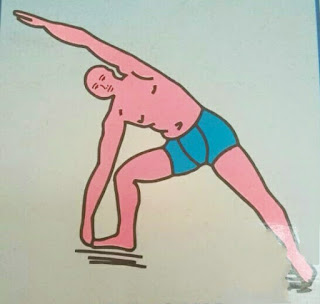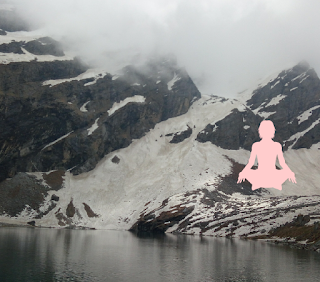How after doing kon asana the body becomes lighter and other asanas seem easier to do
Kon asana is also known as the
triangle posture that is done by half a spinal twist which gives an excellent
lateral stretch to the spine, tones the vertebral nerves and helps the proper
functioning of the digestive system. Kon asana is yet simple to perform and is
not a strenuous exercise. Strenuous exercises make the muscles from the outside
be strong while breathing becomes quick but shallow. This does not reach the
innermost organs and results in weak inner muscles being developed. Yoga is
holistic approach towards the individual and covers many benefits at any stage
of life. Asanas can burn calories, enhances flexibility and reduces the
osteoporosis of bones.
Kon asana is very beneficial for
spine, abdominal and shoulders, but affects the kidneys the most getting them
to work more efficiently by converting prana energy. While Kon asana stretches the
waist completely, it works on insentient energy that cover the kidneys and its
surrounding triggering active energy which manifest stamina, flow of prana
energy and flexibly. Kidneys are a pair
of bean-shaped glandular organ in the back part of the abdominal cavity which
excrete urine and support the removal of waste from the blood. So our kidneys
controls the water element in the body and help cool off the body. Excessive
hot and excessive cold is not good for kidneys that disturbs their equilibrium.
Extreme cold when radiates from the kidneys will weaken the middle and lower
back muscles and results in back pain.
The fascia layer which covers the
kidneys protects and works as a cushion for them. The fascia works just like
the tyres of a vehicle which protect the tender tube. Without the tyre the tube
cannot bear the burden of heavy loads of vehicle. The fascia works in the same
manner and bears the full load of the body while the kidneys provide excellent
health and well-being. In martial arts and yoga these organs be fully purified
for ultimate goal by aspirant. Fascia becomes flexible and contains the life
force or prana energy within and keeps kidneys healthy. Extreme cold or hot has
bad effects upon fascia layers. Then comes the psoas muscles which is also
effected when the kidneys are effected by the cold. Psoas is a long core muscle
connecting the limber vertebrae to the femur. Psoas muscles cannot bear the coldness
of the kidneys and result in the Psoas muscles being cooled or frozen causing
it to become stiff and cuts off the flow of prana energy. The lack of sufficient
heat that keeps warm psoas muscle will become disturbed.
Erratic life styles, fast foods,
insufficient exercises and continuous work in one place are the basic
components that interrupts the workings of the organs. Forwards bending and
backwards bending asanas are essential for the body for well-being. Pranayama,
asana and meditation recalibrates the body movements. After doing Kon asana the
body becomes lighter and other asanas seem easier to do.
Steps to follow:
Stand with your feet well apart (3
to 5 feet apart) depending on the height of individual.
Ensure that both of your knees
are straight.
Bend first to the right and aim
for perfect balance in pose so that you easily will gain the control.
Breathe in, stretch your right
arm out at shoulder level while bringing your left arm straight up as against
left ear.
Breathe out, bend to the right
and as slightly forward to bypass your ribs.
Put your right hand down your
right leg.
Try to be reach at maximum as you
can.
Now look out at left hand and
breathe normally.
Repeat the same with the left
side.
Health Benefits: triangle pose is
beneficial to waist, knees, and legs. Tringle pose makes the spine flexible on
both sides and gives strength to kidneys, stomach and lungs resulting in dormant
muscles becoming active.



Great Jaswinder ji
ReplyDeleteNice
ReplyDeleteVery nice asna for strength of spine , legs and muscles
ReplyDeleteNice
ReplyDeleteGreat Sir
ReplyDeleteVery nice warm up asna before doing other asna
ReplyDelete